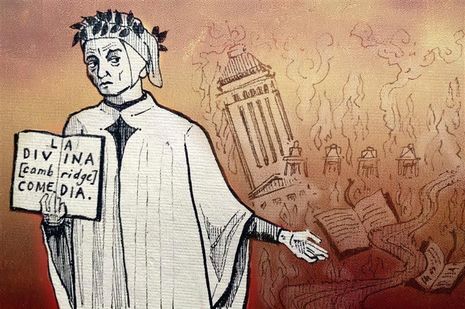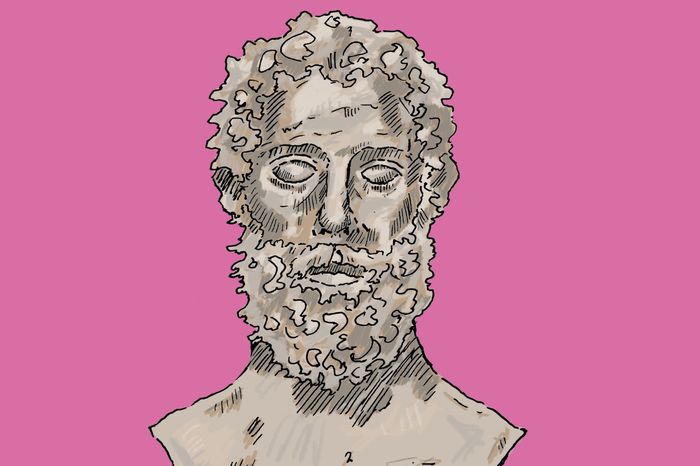Dante-ing through the Cambridge experience
Molly Weston examines the ways in which Dante’s Divine Comedy mirror the Cambridge experience

I didn’t initially (much like yourself, I imagine) see any likeness between Dante’s Divine Comedy and the Cambridge student lifestyle. After all, you may be wondering what a medieval Italian poem could possibly have to do with supervisions, Dos meetings and the occasional trip to Mash. Yet, upon this fated afternoon, I suddenly realised the two share more in common than you may think…
If you have ever read Dante’s Divine Comedy, you will also soon come to notice its alarming parallels with the Cambridge experience. And even if you haven’t yet, I would encourage you to buy it as a nifty guidebook for the coming term. For when you next read the words “Abandon all hope ye who enter here,” rather than Inferno’s stalking demons coming to mind, you may instead think of your recent encounters with exam invigilators.
“Dante may have been trapped in Hell with demons, but being trapped in the library with four essay deadlines feels remarkably similar”
Though perhaps unintended on Dante’s part, to a modern audience, the poem reads more like a phenomenal self-insert fanfiction. All of us are Dante, progressing through the circles of Hell, guided by Virgil’s advice. Except Virgil is your DoS and the nine circles span from Week Zero until the end of term.
For those of you who don’t yet know, each circle of Hell represents increasingly worse misdemeanours and equally grim punishments that Dante is forced to deal with. Week Zero, the moving-in stage, bears a striking resemblance with the first circle, Limbo. Dante arrives, slightly lost, and immediately meets a bunch of scholars and philosophers. He battles with what can only be described as impostor syndrome. Poor guy: you can practically picture him pathetically crying to himself in a corner of the UL. “Neither I, nor others, think me worthy of it,” he says. Is he up to the task? It’s a question we all might ask ourselves. Dante may have been trapped in Hell with demons, but being trapped in the library with four essay deadlines feels remarkably similar.
And then comes Week Five. The parallels between the Week Five blues and the fifth circle of Hell are pretty glaring. Here, Dante encounters the sullen, a gloomy sort of crew. Sound familiar? This mopey lot are condemned to spend an eternity in the River Styx. Luckily for students, week five doesn’t quite last for eternity, and the Cam is mildly more pleasant than the Styx. In saying that, with the sheer amount of E.coli in the Cam, I still wouldn’t fancy a dip.
Much like an unenthusiastic punter, the boatman, Phlegyas, soon arrives to begrudgingly bring Dante and Virgil across the river. But just as it seems Dante might be down on his luck, Phlegyas dumps them at the entrance of Dis: downtown in Hell, the lowest of the low. Fallen angels guarding the entrance slam the gates in Virgil’s face. How rude. I’m sure we can all empathise with Dante here, for this feels (somewhat) like the experience of attempting to enter King’s and being turned away by a porter.
“Much like the library-bound student, Dante’s continuous struggle for knowledge is only realised in the final leg of his journey”
Dante’s trek continues, seemingly endless. But just as they reach the edge of Paradise, Virgil holds what might well be the first ever recorded end-of-term DoS meeting, pats Dante on the back, and sods off. At this point, Dante has become so attached that he has another little cry. Aw. He’s graduating from Hell after all, left with nothing but a CamCors report stating that Virgil has taught him all he can and is passing him on to another supervisor.
But all hope is not lost. Even with hellish supervisions and truly infernal feedback, the end comes with rewards. If your first term is Hell and your second is Purgatory, then Paradise is surely approaching in your third. Much like the library-bound student, Dante’s continuous struggle for knowledge is only realised in the final leg of his journey.
When he eventually hits up the fourth sphere of Paradise, containing the wise, Dante is transformed by these brainy boffins and feels a whole lot better. Personally, like a weary Tripos student, I think he deserves an (almost) eternal amount of food and entertainment at a May Ball and perhaps a night out in Mash after facing these intellectual trials and tribulations.
But, alas, this may be where his account departs from the student experience. Why must we suffer through the stages of Hell before we reach what Dante describes as intellectual enlightenment? I’ve asked myself this, as I frantically flip through pages of towering books and practically chain myself to the desk. I think we must remember this: in the Cambridge world of deadlines, exams and endless reading, taking a moment for the pure enjoyment of being here, learning and existing in the company of good friends is vital. After all, the path to Paradise begins in Hell.
 News / Judge Business School advisor resigns over Epstein and Andrew links18 February 2026
News / Judge Business School advisor resigns over Epstein and Andrew links18 February 2026 News / Hundreds of Cambridge academics demand vote on fate of vet course20 February 2026
News / Hundreds of Cambridge academics demand vote on fate of vet course20 February 2026 News / Petition demands University reverse decision on vegan menu20 February 2026
News / Petition demands University reverse decision on vegan menu20 February 2026 News / CUCA members attend Reform rally in London20 February 2026
News / CUCA members attend Reform rally in London20 February 2026 News / Caius students fail to pass Pride flag proposal20 February 2026
News / Caius students fail to pass Pride flag proposal20 February 2026










